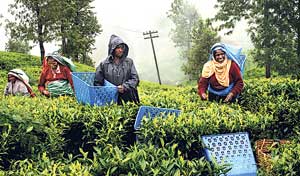
Government support is provided through the Plantation Human Development Trust (PHDT) that has been set up to coordinate an array of activities that bolster the quality of life of estate workers |
|
Several undergraduates whose parents work in the plantations, are among this year’s university entrants, the Planters Association of Ceylon said in a press release.
These include two medical students, one engineering student and five more in other faculties, illustrating the change that is taking place in the estates and how Regional Plantation Companies (RPCs) are promoting the physical, mental, social and spiritual well-being of the estate community.
Government support is provided through the Plantation Human Development Trust (PHDT) that has been set up to coordinate an array of activities that bolster the quality of life of estate workers in 430 plantations that come under Regional Plantation Companies (RPC), Janatha Estate Development Board (JEDB) and Sri Lanka State Plantations Corporation (SLSPC). These activities pivot around maternal care, child nutrition, disease control, family development, even housing and sanitation. Pressing problems in estates such as the prevalence of worm infestation and anaemia among the plantation community are also addressed through de-worming programmes and improved sanitation, the statement said.
A study conducted by the Sri Lanka Business Development Centre on the perceptions of estate youth revealed that they were appreciative of the welfare programmes implemented during the past two decades, particularly with regard to improved housing and sanitation, as well as the availability of pipe borne water and electricity that have made a tremendous difference to life in the estates.
However the most important function that contributes to plantation welfare is the skills development programme. The objective of this programme is to develop self confidence and self reliance among the adolescents in the estates so that armed with the required life skills, they would become valuable investments for the future, with carefully nurtured talents and skills resulting in improved productivity. That is a vital need for Sri Lanka to maintain its competitive edge in the world tea market. |

